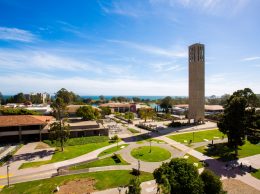SLO family fights state on ‘land grab’
IN THIS ARTICLE
- Top Stories Topic
- Marlize van Romburgh Author
By Marlize van Romburgh Monday, October 18th, 2010
Can the state demand access to a mile of pristine beach land in exchange for permission to fix up an old farmhouse?
A San Luis Obispo County family, backed by one of the state’s top property-rights law firms, is suing the California Coastal Commission to find out.
A family trust led by sisters Denise McLaughlan, Sharyn Schrick and Sandra Bowman owns 400 acres along Highway 1, near the small town of Harmony. The family is suing the Coastal Commission for what it calls an unconstitutional “land grab” — the requirement for public access to a narrow, mile-long strip of coastline after the family applied for redevelopment permits.
The family’s law firm, the Pacific Legal Foundation, has taken coastal property rights cases to the U.S. Supreme Court and won precedent-setting decisions. Its involvement in the Cayucos case brings power, money and legal expertise.
Under California law, the beaches belong to everyone. But that right means little without easements through private property that people can use to reach the coast. Since the 1970s, the Coastal Commission has used its power over development permits to persuade — or force, as some see it — landowners to turn over pieces of property for public access.
The Cayucos case highlights how complicated that dance can become. The family has framed its complaint as a constitutional argument over whether its private property is being taken by the government without just compensation; that is, whether the state’s demands are connected to, and proportional with, the impact on the public of fixing the family’s buildings.
Before the case can get to a battle over constitutional principles, a court will have to decide whose version of the facts to believe. The Coastal Commission says that some basic repair work the family undertook before it applied for a coastal development permit means the family already essentially agreed to the easement if it wants to rebuild its barn.
The property has one house and a barn that was nearly destroyed in a storm, according to the lawsuit, dated Oct. 7. The Coastal Commission granted a permit in August allowing the family trust to rebuild the barn and remodel the house, but as a condition it required the family to keep a strip of oceanfront land, a mile long and 25 to 50 feet wide, open to the public.
In its complaint, the family is asking San Luis Obispo County Superior Court to reverse the Coastal Commission’s decision, saying the agency’s actions amount to extortion.
Different facts
Although the basic outline of events are the same, development officials and the family present different versions of exactly what the family consented to when it said it wanted to remodel the property.
The family trust, led by the now-deceased Walton Emmick and his three daughters, purchased the land in 1992, hoping to renovate the 135-year-old ranch house to an inhabitable family residence. In 2002, Emmick applied to the county to remodel the house, install a septic system and connect the house to an existing well. He also received two over-the-counter repair permits to do minor work on the house, such as re-roofing and foundation repairs.
Soon after, according to the family’s complaint, the County Planning Department told Emmick that it didn’t want to continue issuing repair permits on a piecemeal basis, and asked him to stop work on the property so that it could process a coastal development permit. Emmick stopped work and applied for a new permit.
This is where the two story lines diverge. The Coastal Commission approved the permit in 2004, but the family said it never agreed to the permit’s condition that it establish a public easement on its land, never did the work the permit allowed and never deeded the strip of property. Instead, the family said, it ditched the old permit and started applying for a new one, without the easement conditions.
“The property owners never consented to an easement. If you don’t accept a permit condition and you don’t record it, you don’t consent to it,” Paul Beard, the family trust’s attorney, told the Business Times.
The Coastal Commission says that because the family never appealed the first permit, and performed the repair work cited in it, the permit was in effect whether the family formally assented to it or not. It doesn’t matter that the repair work was already authorized by separate, over-the-counter permits, said Christopher Pederson, senior deputy counsel for the Coastal Commission.
“Given that they didn’t challenge the conditions of the permit and they enjoyed the benefits of the permit, then they’re subject to the conditions,” Pederson said. “They had a period of time when they could have challenged it, but they didn’t.”
Ventura County precedent
If the case ever progresses to constitutional principles, it will hinge on a test developed in part by a case from Ventura County homeowners James and Marilyn Nollan. The Faria Beach residents sued the Coastal Commission when it demanded easements in exchange for the rights to fix up a dilapidated bungalow, which, the commission said, would block views of the ocean.
In 1987, the U.S. Supreme Court sided with the Nollans and determined that there had to be an “essential nexus” between a permit condition and a state interest such as public access to the sea.
Later court decisions added a requirement of “rough proportionality” between a state’s land demands and the scope of the permit. The Pacific Legal Foundation is arguing that the state’s conditions in Cayucos are too big and too unconnected from the work the family wants to do.
“We’re trying to put the nail in the coffin with this one,” Beard said. “The Coastal Commission has to know they’ve got to stop extorting property owners to get what they want.
“Public access to beaches and recreational areas are a good thing. But there are legitimate constitutional means for achieving those goals,” he said. “If the commission or any other governmental entity wants an easement or anything of value from a property owner, it should have to pay for it.”
Steven Amerikaner, a shareholder in the Santa Barbara office of Brownstein Hyatt Farber Schreck who represented Hollywood mogul David Geffen in a similar beach-access case, said he hasn’t seen anything quite like the Cayucous case, with its unusual procedural facts.
“I think it’s going to be an interesting case to follow,” Amerikaner said. “[The Pacific Legal Foundation’s attorneys] tend to be interested in novel questions.”










